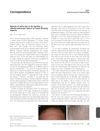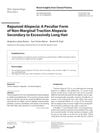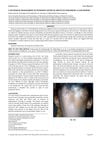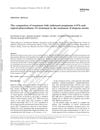Search
for
Sort by
Research
540-570 / 580 results
research Seasonal Patterns and Trends in Dermatoses in Poland
In Poland, people search more for certain skin conditions depending on the season, and despite more STD infections, searches for them have decreased, suggesting a need for better sexual education.

research An Updated Etiology of Hair Loss and the New Cosmeceutical Paradigm in Therapy: Clearing the Big Eight Strikes
New treatments for hair loss should target eight main causes and use specific plant compounds and peptides for better results.

research Alopecia Areata Incognita: A Case Report
A young woman with a rare hair loss condition improved with steroid and biotin treatment.

research Alopecia Areata Incognita
Alopecia areata incognita causes widespread hair loss without patches and needs a scalp biopsy for diagnosis.

research Systemic Treatment for Alopecia Areata
Effective treatments for severe alopecia areata are still lacking.

research Renbök Phenomenon: Alopecia Areata Sparing Psoriasis Plaques
Alopecia areata does not affect areas with psoriasis plaques.

research Presence of Psoriasis in Areas of Balding in Patients with Both Androgenic Alopecia and Scalp Psoriasis
Men with both baldness and scalp psoriasis often don't have psoriasis on bald spots.

research Psoriatic Alopecia
Psoriasis can cause temporary or permanent hair loss.

research Absence of Vellus Hair in the Hairline: A Videodermatoscopic Feature of Frontal Fibrosing Alopecia
Lack of small, fine hair on the front hairline is a key sign of frontal fibrosing alopecia.

research Rapunzel Alopecia: A Peculiar Form of Non-Marginal Traction Alopecia Secondary to Excessively Long Hair
Long hair can cause hair loss due to constant pulling.

research Systemic Causes of Hair Loss
The article concludes that correctly diagnosing systemic causes of hair loss requires a detailed clinical evaluation and a systematic diagnostic approach.
research Alopecia Areata: Prognostic Factors
Alopecia areata is unpredictable, with limited treatment effectiveness, especially in severe cases.

research Non-Ablative Fractional Laser as an Emerging Treatment for Alopecia Areata
Combining corticosteroids and non-ablative fractional laser therapy may effectively treat extensive alopecia areata.

research Trachyonychia in a Child with Concomitant Alopecia Areata and Lichen Planus
A boy's hair, nails, and skin improved after 6 months of steroid treatment.

research A Successful Management of Extensive Alopecia Areata in Childhood: A Case Report
Combining OMP with cyclosporine can effectively treat severe alopecia areata in children.

research Systemic Treatments for Alopecia Areata: A Systematic Review
No systemic treatment for alopecia areata has strong evidence of effectiveness.

research Reduced Level of 25-Hydroxyvitamin D in Chronic/Relapsing Alopecia Areata
People with chronic Alopecia Areata often have lower vitamin D levels.

research Quality of Life Measurement in Alopecia Areata: Position Statement of the European Academy of Dermatology and Venereology Task Force on Quality of Life and Patient-Oriented Outcomes
Use specific tools to measure quality of life in alopecia areata patients and improve future treatments.

research Comparison of Treatment with Clobetasol Propionate 0.05% and Topical Pimecrolimus 1% in Alopecia Areata
Clobetasol and pimecrolimus are similarly effective for alopecia areata, but pimecrolimus has fewer side effects and is preferred for long-term use.

research An Excellent Response to Tofacitinib in a Brazilian Adolescent Patient with Alopecia Areata: A Case Report and Review of the Literature
A Brazilian teenager with severe hair loss had total hair regrowth with no side effects after using tofacitinib.

research Audiological Abnormalities in Patients with Alopecia Areata
People with alopecia areata may be more likely to have a certain type of hearing loss.

research Alopecia Areata: Combination Therapy with Isotretinoin (0.05%) Gel and Minoxidil (2%) Solution
Using isotretinoin gel and minoxidil solution together effectively regrows hair in most people with patchy hair loss.

research Treatments for Alopecia Areata: A Network Meta-Analysis
The analysis aims to identify the most effective and safest treatments for alopecia areata.

research Past, Present, and Future Treatment of Alopecia Areata
More research is needed to find the best long-term treatments for Alopecia Areata.

research Recalcitrant Widespread Alopecia Areata in a Child Treated Successfully with Oral Methylprednisolone Pulse Therapy
Oral methylprednisolone pulse therapy helped an 11-year-old regrow 80% of his hair in six months.
research Mesalazine in the Treatment of Extensive Alopecia Areata: A New Therapeutic Option?
Mesalazine may help treat extensive alopecia areata effectively.
research Assessing the Role of Stressful Life Events in the Induction and Recurrence of Alopecia Areata: A Case-Control Study
Stress can trigger or worsen alopecia areata.

research Alopecia
Alopecia areata is a reversible, autoimmune-related hair loss that can have significant emotional impact and uncertain treatment effectiveness.

research Treatment of Moderate-to-Severe Alopecia Areata in Adolescents With Baricitinib: A Retrospective Review of 29 Patients
Baricitinib helped most teenagers with severe hair loss regrow hair and had mild side effects.